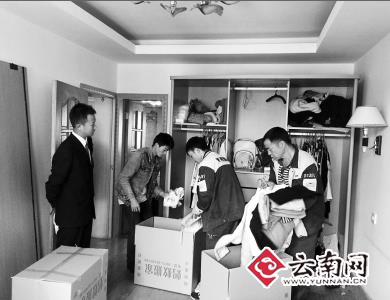

This is a very complicated and sad case: during the period when Ms. Guo and Mr. Yu lived together, Mr. Yu lent Ms. Guo 100,000 yuan for capital turnover. I didn’t know that Mr. Yu was preparing to open a hot pot restaurant in partnership with his friend Mr. Chen, and 100,000 yuan was Mr. Chen’s investment. More tragically, six days later, Ms. Guo was killed by the other party when she went to collect debts from others, leaving her daughter Miss Yan a house of more than 170 square meters. Mr. Chen repeatedly asked Mr. Yu to pay back the money, and the court also sentenced him, but Mr. Yu was unable to repay it. Finally, Mr. Chen found Miss Yan and asked the mother to pay back the debt. After the judgment of the Panlong District People’s Court in Kunming, Miss Yan refused to pay compensation. Yesterday, the executive board of Panlong Court forcibly vacated the house inherited by Miss Yan.
beginning
100,000 yuan loan leads to bizarre cases.
Let’s first sort out the complicated relationship between the parties in this case.
Ms. Guo is a Kunming native, an individual industrial and commercial household, divorced, and has a daughter, Miss Yan. She and Mr. Yu, who are several years older than herself, lived together soon after they met.
Mr. Chen and Mr. Yu, who were doing business in Kunming, were good friends and were preparing to do business together.
Due to financial difficulties, Ms. Guo’s business plummeted, and she borrowed money everywhere to maintain her business. Seeing that Ms. Guo really can’t hold on, how can Mr. Yu be indifferent? At that time, Mr. Yu was planning to open a hot pot restaurant with Mr. Chen, who had given him an investment of 100,000 yuan. On July 15, 2008, Mr. Yu lent this money to Ms. Guo for emergency. After getting the money, Ms. Guo wrote a 100,000 yuan debt to her boyfriend.
develop
Girlfriend was killed and left a triangle debt.
Ms. Guo’s business needs a large amount of capital turnover, but she can’t get the money she lent back. During that time, she went around looking for debtors to collect debts. On the sixth day after she got 100,000 yuan from Mr. Yu, that is, on July 21, 2008, Ms. Guo had an argument when she was looking for a debtor to collect debts, and was killed by the other party.
As a good friend of Mr. Yu, Mr. Chen also took part in the aftermath, and learned that he was going to jointly open a hot pot restaurant with an investment of 100,000 yuan, which was lent by Mr. Yu to Ms. Guo, who died unfortunately. The money was gone, and the hot pot restaurant was not opened. Mr. Chen and Mr. Yu turned against each other for this. This 100,000 yuan also became a triangular debt, which lasted for 8 years.
Mr. Chen found Mr. Yu many times and wanted to return the investment of 100,000 yuan, but at this time, Mr. Yu simply could not come up with 100,000 yuan. When he was in a hurry, he simply said that the money was lent to Ms. Guo, and Ms. Guo was dead. "Go to find someone to die."
For this 100,000 yuan, Mr. Chen took Mr. Yu to court. On May 25, 2012, the Xishan District People’s Court made a first-instance judgment and ordered Mr. Yu to return 100,000 yuan to Mr. Chen. After the judgment came into effect, Mr. Yu has not paid back the money.
On June 3, 2013, Xishan Court ruled that Mr. Yu had to terminate the execution because he had no property to execute. In other words, although Mr. Chen won the lawsuit, because Mr. Yu had no property to execute at all, he could not execute it. What should we do?
climax
100,000 yuan creditors demand that the mother debt be repaid.
Although Mr. Yu has no executable property, it is an indisputable fact that he lent 100,000 yuan to Ms. Guo, but Miss Yan, who inherited her mother’s property, refused to repay her debts. How can I get my money back? When consulting a lawyer, Mr. Chen heard a legal term-"subrogation", so he regarded it as the last straw.
On March 26, 2014, Mr. Chen sued Miss Yan to Panlong Court and asked Miss Yan to pay her debts for her mother. On November 11, 2014, Panlong Court made a judgment of first instance, and ordered Miss Yan to repay Mr. Chen a loan of 100,000 yuan within the scope of inheriting Ms. Guo’s legacy, but Miss Yan refused to pay compensation and said, "I didn’t borrow the money, so why should I pay it back?"
final result
The house left by mother was executed.
Chen Wei, deputy director of the Executive Board of Panlong Court, said that Miss Yan, as the executor, actually controlled the late mother’s property, but she refused to bear the responsibility of repayment. The court can only enforce it.
Yesterday morning, when the executive judge and his party came to Miss Yan’s home in Bailong New District, Panlong District, they found that Miss Yan had rented this duplex building of more than 170 square meters left by her mother to four people at a price of 2,500 yuan per month. The tenants said that they only moved in in August this year and the rent has been paid in February next year.
Subsequently, the executive judge also found that Miss Yan inherited a 16-square-meter garage, which was also rented out. When I opened the garage, it became a small warehouse for building materials. Miss Yan knew about the court’s execution, but she didn’t show up. Let a stranger send a message to the judge, and he will pay back the money for Miss Yan, hoping that the court will give a few days’ grace. The court did not believe what he said, but still forced the tenant to move.
Zhou Rui, director of the executive board of Panlong Court, said that this is the first case that Panlong Court enforced by exercising "subrogation" for more than 20 years. The court will dispose of the vacated house according to law to repay the triangular debt.
Yunbao All-Media Reporter Xia Tilei’s Photo Report
Noun interpretation
What is subrogation?
Subrogation application for execution, also known as subrogation execution, refers to a system in which the person subjected to execution cannot perform the obligations specified in the legal documents, and the people’s court notifies the third person who has debts to the person subjected to execution according to the application of the person subjected to execution, and directly performs the debts to the person subjected to execution.